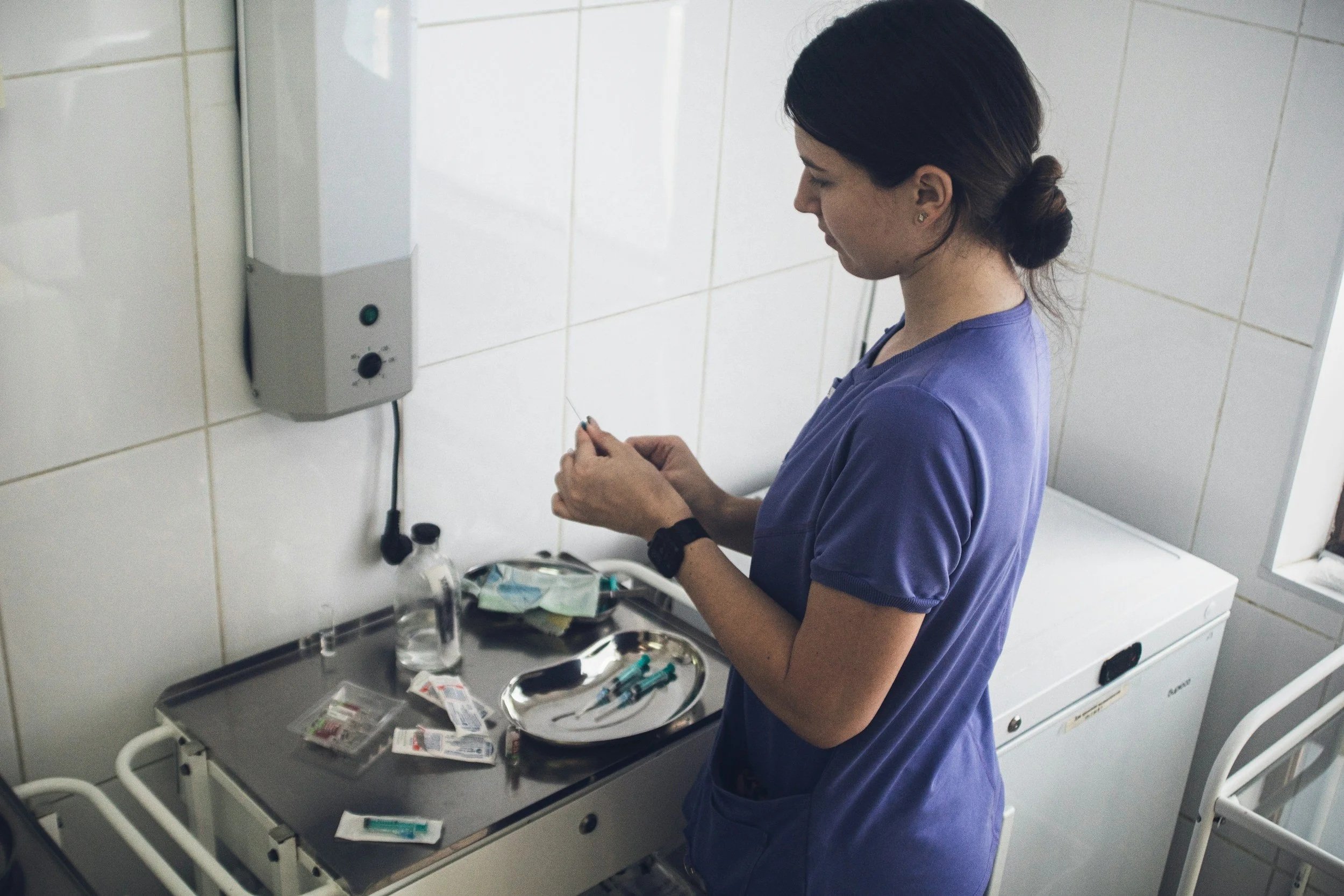The idea of freezing eggs may seem daunting, especially when injectable medications are involved. However, most patients tolerate the process extremely well with minimal side effects. Dr. Kathryn Snow explains some of the side effects that you may experience when undergoing the egg freezing process.
Common Side Effects
Nausea: Most clinics will have you begin an oral contraceptive pill (OCP) in order to put your body “on pause” at the start of your period. For some patients, they experience nausea and even vomiting from an OCP. Typically, you are not on the birth control pill for more than one to two weeks but talk to your doctor if you are unable to tolerate it as lower dose alternatives may be able to be prescribed.
Bloating: This is by far the most common side effect that patients experience. As you take the injections, they act by stimulating your ovaries to make eggs. This, in turn, causes your ovaries to enlarge which often leads to bloating. This is most notable toward the end of your injection course, which lasts in total about two weeks. Typically, the bloating will resolve within the week after your egg retrieval. Comfy clothes will be your best friend!
Weight Gain: It is not uncommon to gain a small amount of weight (i.e., less than 5 pounds) throughout the egg freezing process. This is secondary to the hormones causing your ovaries to enlarge, and this should not be permanent weight but rather water weight.

Headaches and Breast Tenderness: As the medications begin to work, your hormone levels will rise. This can cause headaches and breast tenderness for some patients. It is completely fine to treat the headaches with any over the counter or prescription medications you may have on hand for headaches. Unfortunately, the breast tenderness cannot be solved with any medications, but a supportive sports bra can be helpful in minimizing any irritation you may experience.
Constipation: As your body adjusts to the medications and increasing hormones, it is not uncommon for you to experience mild constipation. Stool softeners are perfectly safe to consume during the egg freezing process and drinking plenty of fluids is advised.
Rare Side Effects
Ovarian Torsion: Ovarian torsion occurs when the ovary twists around the ligaments that typically hold it into place. This is secondary to the ovaries being very enlarged, and patients who experience torsion will have an acute, sharp pain in their lower abdomen. While rare, this is a surgical emergency since the twisting of the ovary can result in reduced blood flow and ultimately cause the ovarian tissue to die. Fertility providers typically encourage patients to avoid intense exercise throughout the egg freezing process, particularly towards the end of the injections/at time of egg retrieval where the ovaries are most enlarged and at risk for twisting on themselves.
Ovarian Hyperstimulation Syndrome (OHSS): OHSS occurs when the blood vessels surrounding the stimulated ovaries leak fluid. This often causes bloating and abdominal discomfort from the swollen ovaries, and this is more likely to occur in patients who are produce a large number of eggs (i.e., over 25 eggs). Women with PCOS are at a higher risk for mild OHSS. More serious manifestations include difficulty hydrating or urinating, excessive weight gain, severe abdominal pain, and even blood clots. If you believe you’re experiencing any of these severe symptoms, your doctor will need to know as soon as possible. However, the likelihood of serious OHSS has been drastically reduced due to alterations in fertility treatments and management over the years.

Dr. Kathryn Snow is a Reproductive Endocrinologist at Piedmont Reproductive Endocrinology Group (PREG). She completed her OB/GYN residency at Mount Sinai in New York City. She assisted in developing a cervical cancer screening program in South Africa and rotated at the National Institutes of Health (NIH). After residency, she pursued her training in Reproductive Endocrinology and Infertility at Duke University where she trained with pioneers in the field of IVF. She is passionate about spreading awareness about reproductive health and empowering patients with evidenced-based information regarding their fertility options.
Learn more about PREG’s egg freezing practice on Freeze.
Answered by Dr. Roy Handelsman from HRC Fertility. Understand how ovarian cysts and ovarian surgery may impact the egg freezing process.
Answered by Dr. Rashmi Kudesia from CCRM Fertility Houston. Here’s a checklist for before, during, and after your egg freezing consultation, including 11 questions you should ask the doctor.
Answered by Valerie Shafran, MSN, FNP-C from Extend Fertility. Discover why fertility experts urge women to stop taking GLP-1 agonists before an egg freezing cycle.
Answered by Dr. Nidhee Sachdev from South Coast Fertility Specialists. Explore what AMH tells us about a woman’s ovarian reserve or how many eggs she has left.
Answered by Dr. Hade from Generation Next Fertility. Understand how egg freezing does not cause long-term weight gain yet there is a chance of transient bloating.
Answered by Rijon Charne, JD from Sunray Fertility. Explore what a reproductive estate plan entails and the situations where having one can make a big difference.
Answered by Rijon Charne, JD from Sunray Fertility. Learn more about the importance of clinic disposition forms, including what they do and don’t cover.
Answered by Rijon Charne, JD from Sunray Fertility. Discover the legal nuances that can shape your options when freezing eggs or embryos.
Answered by Dr. Joshua Klein from Extend Fertility. Learn how birth control relates to egg freezing and if you will need to stop your hormonal birth control before starting the procedure.
Answered by Dr. Jesse Hade from Generation Next Fertility. Discover the important factors that affect chances of egg freezing success in your late thirties.
Answered by Sidonia Buchtova, PA-C, C-RHI from Refresh Psychiatry. Understand if you can stay on an SSRI or SNRI when freezing your eggs.
Answered by Sidonia Buchtova, PA-C, C-RHI from Refresh Psychiatry. Discover tips to help support your mental well-being during preparation, throughout the cycle, and after your egg retrieval, especially if you have a history of anxiety.
Answered by Dr. Katharina Spies from Vida Fertility. Learn about who should consider supplements before and during fertility preservation, and how supplements could support your egg freezing cycle.
Answered by Dr. Serin Seckin from Generation Next Fertility. Understand the key differences to help you make an informed decision that aligns with your personal and reproductive goals.
Answered by Dr. Ido Feferkorn from the Reproductive Medicine Group. Learn how Polycystic Ovarian Syndrome (PCOS) may affect the egg freezing process and outcomes of fertility preservation.
Answered by Dr. Meera Shah from Nova IVF. Understand the potential risks of egg freezing to help you evaluate if it is right for you.
Answered by Dr. Hade from Generation Next Fertility. Learn from start to finish the entire process of what happens on the final day of an egg freezing cycle.
Answered by Dr. Sahar M. Stephens from Northern California Fertility Medical Center. Understand the probability of pregnancy based on the number of eggs frozen and the age at which you freeze.
Answered by Dr. Alison Peck from HRC Fertility. Discover which medications are commonly used for ovarian stimulation during an egg freezing cycle.
Answered by Dr. Kathryn Snow from Piedmont Reproductive Endocrinology Group (PREG). Understand the side effects that you may experience when freezing your eggs.
Answered by Lia Schiller, MSN, AGNP-BC from Extend Fertility. Learn why IUDs can stay in place throughout the egg freezing process.
Answered by Dr. Woo from HRC Fertility. Learn how some medications need to be stopped for an egg freezing cycle while some medications can be continued.
Answered by Dr. Dan Nayot from The Fertility Partners. Learn how artificial intelligence is providing women with more information than ever before about their eggs.
Answered by Dr. Joshua Klein from Extend Fertility. Egg freezing doesn’t impact your chance of getting pregnant naturally, because egg freezing makes use of eggs that would otherwise have been lost.
Answered by Dr. Dan Nayot from The Fertility Partners. Understand the distinction between egg quantity and quality, and explore how AI is transforming egg quality analysis.
Answered by Dr. David E. Tourgeman from HRC Fertility. Understand what options exist for what to do with your frozen eggs if you decide not to use them for IVF.
Answered by Dr. Armando Hernandez-Rey from Conceptions Florida. Learn about minimal stimulation egg freezing cycles and how they can decrease the risk of ovarian hyperstimulation syndrome.
Answered by Dr. Ido Feferkorn from the Reproductive Medicine Group. Find out how egg freezing medications work and how protocols can be adjusted if you can’t take estrogen.
Answered by Dr. Ido Feferkorn from Reproductive Medicine Group. Learn how egg freezing fits into the menstrual cycle and how timing can be customized.
Answered by Dr. Elena Santiago from Vida Fertility. Understand the ins and outs of egg freezing in Spain as a non-resident, including timing, costs, and more.






























